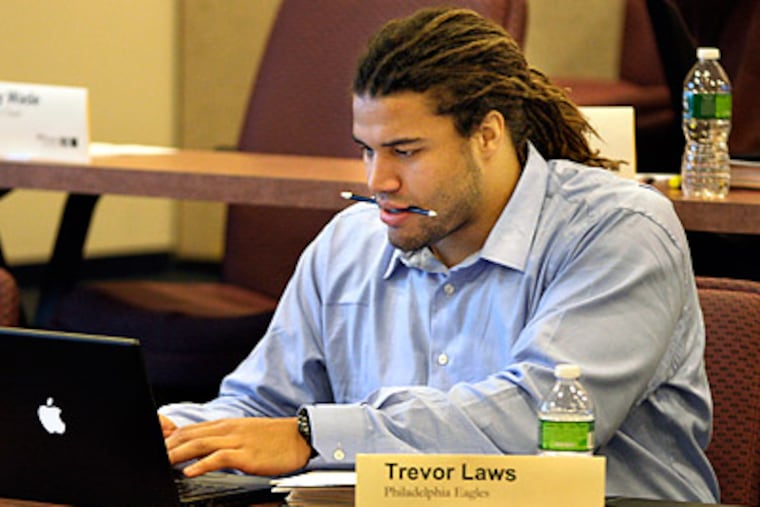Eagles' Laws prepares for life off gridiron
Trevor Laws is going back to school because he wants to be prepared for life after football. After a season in which he went from being part of the Eagles' defensive-tackle rotation to being inactive, that time may come sooner rather than later for the former second-round draft pick.

Trevor Laws is going back to school because he wants to be prepared for life after football.
After a season in which he went from being part of the Eagles' defensive-tackle rotation to being inactive, that time may come sooner rather than later for the former second-round draft pick.
Still, the lessons Laws is learning this week in the NFL's Business Management and Entrepreneurial Program could just as easily apply to his current standing with the Eagles.
At Penn's Wharton School of Business, Laws is one of 37 active or retired NFL players to receive instruction from some of the finest business professors in academia. And on Tuesday, during the first class, they took turns playing opposing roles in negotiating employment.
Laws squared off against Robert Royal, a tight end for the Cleveland Browns. Laws was the candidate; Royal, the recruiter. If the encounter had occurred on the field, Laws might have wound up pinned on his back.
"He was ahead of me the whole time," Laws said during a lunch break at the Steinberg Conference Center on Penn's campus. "I'm thinking, 'All right, I'm going to make this concession and you're going to give me this,' but really the whole time it was better for him."
There aren't often such confrontations in the NFL, at least with a player negotiating with a head coach over his playing time or employment. However, if Laws were to have a sit-down with coach Andy Reid this off-season over his future with the Eagles, he's not sure the result would be much different from the one with Royal.
"I don't know if that's a negotiation I'd win," said Laws, easygoing and affable. "He's very good. He doesn't give you much to go on. But he does let you know where you stand. . . . He's the captain of the ship."
Laws, 24, is just one of many Eagles players who aren't likely to know their fates for a few months. After a season that ended with two blowout losses to Dallas, there are going to be changes. There always are.
In the NFL, contracts aren't guaranteed, so no one is immune to the chopping block. It's one of the reasons the business program, now in its sixth year, is so popular.
The average career length for an NFL player is 31/2 years. Laws, like the 76 other players participating in programs at Penn and Harvard, knows he has only so much time to capitalize on the profit and notoriety playing professionally brings.
"You come in and, after a tough day in the league, you realize your body hurts a lot and you're not going to be able to play at this level for as long as you want," Laws said. "I'm in my second year here and I'm like, 'Aw, my body already hurts. What am I going to be doing after 10 years?' So you've got to prepare."
For Ken Shropshire, a professor at Wharton and an author of several prominent books on the business of sports, the program is a valuable tool for athletes who instantly find themselves wealthy.
"Most of them have degrees, and they've made a considerable amount of money," Shropshire said. "But their level of maturity - or for most people their age - isn't what it should be because of their profession and their income."
Troy Vincent, Brian Dawkins, and Brian Westbrook are prominent alumni of the program. Laws applied based on the suggestion of Victor Abiamiri, a teammate and former Notre Dame roommate, who is also hoping to forge a post-football career in real estate.
"Victor took the program last year and made tons of great contacts around the area," Laws said. "He's been out looking at houses and investment properties in Philly."
Laws, who graduated from Notre Dame with a 3.3 grade point average, holds a marketing degree. But he wants to own property, and said marketing himself as a brand could assist such efforts.
Dreadlocked and 6-foot-1 and 304 pounds, Laws is often noticeable walking the streets near his residence in Old City.
He lives there with his fiancee, Stephanie Wehrenberg, a freshman law student at Penn. Their wedding is set for March 2011. Laws is hoping the pair is still in Philadelphia in a year's time.
"I think there could be some major changes" this off-season, he said. "I don't know what that could mean for me or my position - defensive tackle - but I've thought about it.
"You can really get stressed out about it if you think about it too much. . . . But I decided not to focus on it and focus my attention on getting better and doing other things like this."
Because of DeSean Jackson's meteoric rise, it is sometimes forgotten that he was drafted two picks after Laws in 2008. Laws played in every game as a rookie, but slid down the depth chart last season. Antonio Dixon, an undrafted rookie, supplanted him, and by Week 13, Laws wasn't dressing.
"I think some of it had to do with [Dixon] and some of it had to do with my production," Laws said. "You could see why they wanted him in there. We're total opposites of each other - he's much bigger - and they needed someone on goal-line and short-yardage [defenses]."
Apparently, Laws still needs work on his negotiating skills if he's ever to get that meeting with Reid.
"It's a learning experience," Shropshire said. "There are going to be two more opportunities" to negotiate in class. "He'll learn by doing."